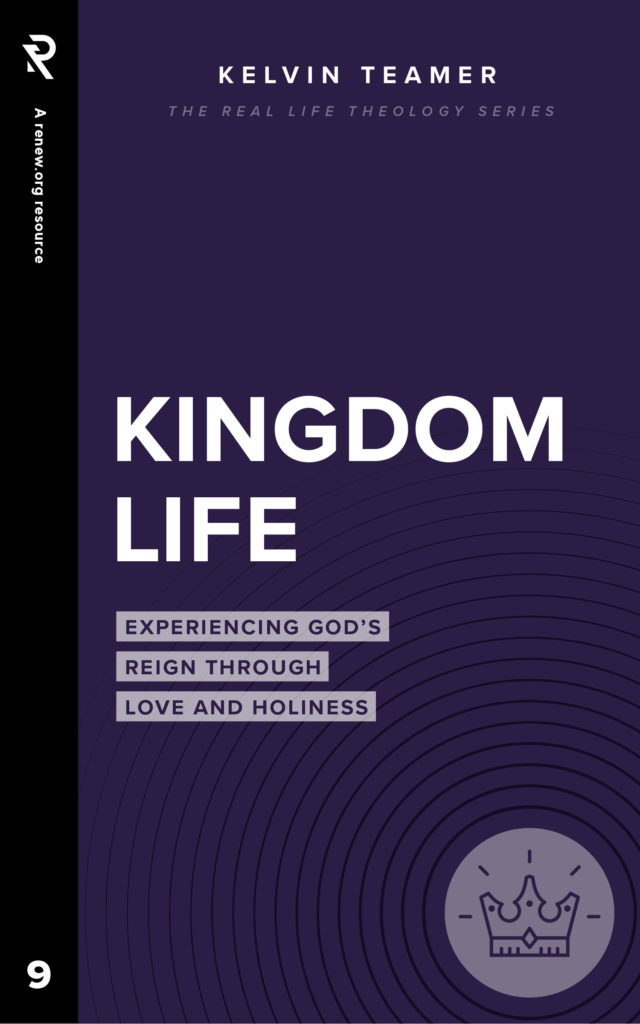
The World and the Way: Living in Hope When Facing Antagonism
The Way of Jesus is fundamentally loving.
If you’re reading this as a follower of Christ, this is probably (hopefully) not a very new or controversial statement. In Jesus’ own words, “By this everyone will know that you are my disciples: if you love one another.” Or if you prefer the hymn’s translation of John 13:35: “They will know we are Christians by our love.” At a basic level, our faith is something positive that we have the privilege of offering others.
However, I think the inverse implication of the opening statement can be more of a challenge to live out practically. If the Way of Jesus is fundamentally loving, it is also true that the Way of Jesus is not fundamentally antagonistic.
We are not called to oppose. People created in the image of God and desperately loved by Him are not our enemy. There are only three enemies that the Christian stands against: the flesh, the devil, and the world. For this conversation, it’s important to understand what we mean by “the world”, so that we don’t confuse it with the people who live under its influence.
“There are only three enemies that the Christian stands against: the flesh, the devil, and the world.”
Under the fall and afflicted by sin, the world itself is an antagonistic environment. Jesus describes Satan, the devil, as “the prince of this world,” at least for now; this prince’s reign plays out through the systems, pursuits, and priorities that rebel against the one Lord God. Dallas Willard defines “the world” as “our cultural and social practices that are under the control of Satan and, thus, opposed to God.” John Mark Comer, discussing the three enemies in his book Live No Lies, provides a wordier summary: the world is “a system of ideas, values, morals, practices, and social norms that are integrated into the mainstream and eventually institutionalized in a culture corrupted by the twin sins of rebellion against God and the redefinition of good and evil.”[1]
The world we live in is actively seeking to deform us—literally, to form us out of Christlikeness. It does this effectively through a constant stream of subtle but pervasive lies. The world’s lies seek to convince us that contentment will come with our next purchase; that even if the desires of our flesh disagree with Scripture, they can’t really be wrong; that we have the right to freedom, regardless of how freedom’s application affects the baby killed during a abortion or the adult killed by our firearm; ultimately, that God doesn’t want the best for us, or know better than us. And once the world has its deceptive hooks in us, it labels anyone who disagrees as enemy.
“Once the world has its deceptive hooks in us, it labels anyone who disagrees as enemy.”
We live in a world that identifies itself by what it is against and tries very hard to conform us to the same pattern. But the Way of Jesus is not defined by who or what it is against.
Rather, followers of Christ are identified by love, and by the holiness that love motivates. We unapologetically stand against the world, flesh, and devil—but this against-ness is not what defines us. N.T. Wright describes the way the early church exemplified this kind of identity:
“For Jesus-followers, worshipping the true and living God, who had acted dramatically in the gospel events and who was now continuing to act powerfully by his spirit, generated and sustained a new kind of communal life, holding it together and fostering its stability—at the necessary cost of disrupting the tidy patterns of all the other communal life of the region.”
N.T. Wright, Paul: A Biography, pg. 156
The early community of Christians was given the task of colonizing the world while they waited in hope for Jesus’ return. How did they go about this? I think Acts 2:42-47 reveals a pretty good answer: by living in fellowship, sharing property and possessions according to need, studying Scripture, and praising God. By cultivating a community marked by love that people on the outside couldn’t help but notice.
“By cultivating a community marked by love that people on the outside couldn’t help but notice.”
They pursued holy lives in community, too—but not for the sake of being holier-than. The Pharisees were known for their pride in their different-ness, but this new community of Christians had love to motivate them. They believed that the word of a loving God was truly best, that His instructions for a holy life pointed the way to true abundance.
The “necessary cost” of this Way of living was that it thoroughly disrupted the ways of the world. Christians hadn’t set out to establish a beachhead in a culture war, because the people of the world were not their enemy. (To quote Comer again, “There’s no such thing as a Christian culture,” anyway.) And yet, to cling to Jesus’ example of love and offer it to others goes against the grain of our current lived reality. Living holy lives identified by love flies in the face of the world we inhabit.
This is why the New Testament authors anticipate persecution as the norm. Ironically, refusal to be identified by antagonism invites antagonism.
“Refusal to be identified by antagonism invites antagonism.”
(I think it’s interesting to note that in Scripture, persecution of Christians came first from the Jews. The people who prided themselves on their knowledge of Scripture were the ones chasing Paul out of every town he preached to. The ones who should have been the first to understand prophecy fulfilled were the ones accusing Jesus of blasphemy. Jesus was killed by the Romans, yes…but the Romans mainly acted to govern and protect the Pax Romana, the national peace. It was the Jews’ loud reaction against Jesus that disturbed the peace…but for the empire, it was easier to simply eliminate Jesus and any subsequent followers of his Way.)
Romans 12 opens with the instruction: “Do not conform to the pattern of this world, but be transformed by the renewing of your mind.” When we refuse to be conformed to the pattern of this world—in this case, the pattern of opposition—the world will react against us. I wonder if this is why Romans 12 goes on to teach about functioning as part of the communal body of Christ, remaining joyful through affliction, and blessing persecutors. (You wouldn’t have to tell someone to bless their persecutors if they didn’t have persecutors!) Picking up in verse 17, Paul writes:
“Do not repay anyone evil for evil. Be careful to do what is right in the eyes of everyone. If it is possible, as far as it depends on you, live at peace with everyone. Do not take revenge, my dear friends, but leave room for God’s wrath, for it is written: ‘It is mine to avenge; I will repay,’ says the Lord. On the contrary:
‘If your enemy is hungry, feed him;
If he is thirsty, give him something to drink.
In doing this, you will heap burning coals on his head.’
Do not be overcome with evil, but overcome evil with good.” (Romans 12:17-21)
How do we endure persecution when it comes? We endure persecution by continuing to live holy lives marked by love while waiting in hope.
“We endure persecution by continuing to live holy lives marked by love while waiting in hope.”
The New Testament doesn’t seek an escape from the reality of persecution. The encouragement of Scripture is not to stockpile weapons or draft Tweets, nor is it to find a way out or to eliminate our oppressors. We do not “colonize” the world in that way; there is no such thing as a Christian culture, so we need not chase after creating one. We are already the Church. We continue in the same Way as always, with hope for the future.
Paul wrote these words to the Thessalonian church as they endured persecution:
“Therefore, among God’s churches we boast about your perseverance and faith in all the persecutions and trials you are enduring. All this is evidence that God’s judgment is right, and as a result you will be counted worthy of the kingdom of God, for which you are suffering. God is just: He will pay back trouble to those who trouble you and give relief to you who are troubled, and to us as well. This will happen when the Lord Jesus is revealed from heaven in blazing fire with his powerful angels. He will punish those who do not know God and do not obey the gospel of our Lord Jesus. They will be punished with everlasting destruction and shut out from the presence of the Lord and from the glory of his might on the day he comes to be glorified in his holy people and to be marveled at among all those who have believed. This includes you, because you believed our testimony to you.” (1 Thessalonians 1:4-10)
To a Christian reader suffering persecution, this is not a “hellfire and brimstone” passage, scaring people into heaven. Instead, Paul’s emphasis lands on the righteousness and justice of God, His promise to one day avenge His people, and the hope of being included in His glory when He comes. A teacher recently said it this way: “Persecution sharpens Christian hope and eschatology.”[2] It keeps our focus where Paul puts the emphasis.
“Persecution sharpens Christian hope and eschatology.”
It might be obvious, but it’s important to say: In the USA, we do not face this kind of persecution. Some corners of our nation definitely voice more opposition to our faith than others, but Christians here are by no means widely oppressed. (You can read this article on the persecution of Indian Christians and consider the difference between our circumstances, if you’d like, and pray Paul’s words from 1 Thessalonians 1 over their churches.) If the New Testament teaches us to expect persecution as the norm, we must wrestle with the question: why haven’t I faced it? Am I simply so blessed that I get to avoid oppression? Or is my way of living and loving not yet radical enough to step on the world’s toes?
If we did experience the kind of persecution that sharpens our eschatology, we might read Revelation similar to how we read the other 65 books of the Bible. Written to churches facing intense persecution under the reign of Domitian, the book of Revelation is just that—a lifting of the spiritual veil to reveal, through poetry and metaphor, the reality we are living in.
Revelation 12 is appropriate for both our topic and each Christmas season you find yourself in! Although Luke 2 is the more common pick for a Christmas sermon text, Revelation 12 contains a spiritually-aware birth narrative recorded by John. In this apokalupsis (the Greek word meaning “revelation,” not “end of the world”), John retells the story of Jesus’ birth through an entirely new, thoroughly confusing, and slightly terrifying lens.
“A great sign appeared in heaven: a woman clothed with the sun, with the moon under her feet and a crown of twelve stars on her head. She was pregnant and cried out in pain as she was about to give birth. Then another sign appeared in heaven: an enormous red dragon with seven heads and ten horns and seven crowns on its heads…The dragon stood in front of the woman who was about to give birth, so that it might devour her child the moment he was born. She gave birth to a son, a male child, who ‘will rule all the nations with an iron scepter.’ And her child was snatched up to God and to his throne.”
Then the dragon—the devil, a spiritual being in rebellion against God—loses a heavenly battle and is thrown down to earth.
“When the dragon saw that he had been hurled to the earth, he pursued the woman who had given birth to the male child. The woman was given the two wings of a great eagle, so that she might fly to the place prepared for her in the wilderness, where she would be taken care of for a time, times and half a time, out of the serpent’s reach. Then from his mouth the serpent spewed water like a river, to overtake the woman and sweep her away with the torrent. But the earth helped the woman by opening its mouth and swallowing the river that the dragon had spewed out of his mouth. Then the dragon was enraged at the woman and went off to wage war against the rest of her offspring—those who keep God’s commands and hold fast their testimony about Jesus.”
John’s takeaway from the Christmas story: followers of Jesus should expect persecution. (Happy holidays!)
“Followers of Jesus should expect persecution.”
In Revelation 12, the dragon is revealed to be our true enemy. Since he was powerless to stop the birth of Christ, he settles on waging war against those who follow the Way of Jesus while he can. This war is the reality in which we live today! Even for those of us who are not being martyred or even minorly inconvenienced for our faith, it’s important to understand there is an enemy seeking to consume us—a dragon out to destroy followers of the Lamb. There are “beasts” seeking to distract us and garner our worship for themselves. There is spiritual attack all around us, if we have eyes to see, which heightens our awareness of persecution as we identify with the least of these.
But there is also hope. It is not yet fully seen, but this hope fixes our eyes on God’s promise. The hope for God’s justice frees us to love those who oppose us without need for vengeance. The hope of Christ’s imminent return strengthens us to expect persecution and endure it when it comes. The hope to be with Him in glory spurs us on in the way of Jesus, in loving community with one another.
“The hope to be with Him in glory spurs us on in the way of Jesus.”
In the meantime, consider Scripture’s instruction to a persecuted people seeking to follow the Way:
“The end of all things is near. Therefore, be alert and of sober mind so that you may pray. Above all, love each other deeply, because love covers over a multitude of sins. Offer hospitality to one another without grumbling. Each of you should use whatever gift you have received to serve others, as faithful stewards of God’s grace in its various forms. If anyone speaks, they should do so as one who speaks the very words of God. If anyone serves, they should do so with the strength God provides, so that in all things God may be praised through Jesus Christ. To him be the glory and the power forever and ever. Amen.”[3]
The Way of Jesus is not fundamentally antagonistic. Therefore, expect antagonism from the world, and endure in the same Way as always.
[1] John Mark Cover, Live No Lies, John Mark Comer, 203-205.
[2] Credit to Ben Cross for his teaching in the residency program at Southeast Christian Church, as well as for assigning us to read N.T. Wright’s Paul, quoted earlier.
[3] 1 Peter 4:7-11.
For more from Nathan, see ndstorms.com.








